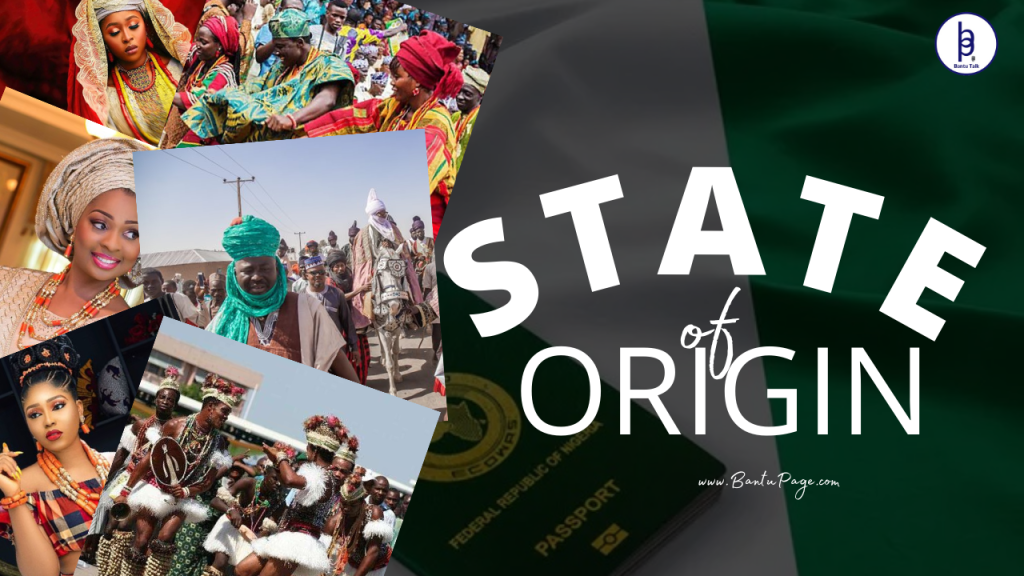
Typically, when you discuss a person’s origins, you are discussing their ethnicity or country. Our ethnicity is our primary identifier; there are ethnic groups that make up each race, and we are all born into one of these groups. This occasionally touches on issues related to skin tone, physiognomy, language, or prevalent conventions, cultures, and traditions.
What does “state of origin” mean in Nigerian?
The nation of your father issues a certificate of state of origin. Nigeria is patrilineal, therefore you are born with the ancestry of your father. One must submit an application in their LGA (Local Government Area) in order to receive such a certificate.
The Northern Nigeria Protectorate and the Southern Nigeria Protectorate were combined to form the colony of Nigeria in 1914. The British, a former colonial power, were the ones to start the unification because they wanted to benefit economically from the merger. Economically, Northern Nigeria lagged behind Southern Nigeria, which supported the North.
Lord Frederick Lugard
The Colony and Protectorate of Nigeria was established on January 1, 1914, following the consolidation of the Northern and Southern Nigeria Protectorates by Lord Frederick Lugard. In 1960, 46 years later, Nigeria gained its independence.
State of the Union | National Unity
In order to assure unity and nationhood, all the ethnic groups were brought together during this process, and a polity was created as a result.
Nigeria’s recently ended presidential election exposed the ethnocentric norm that has persisted in the country ever since its union. In Lagos State, where Tinubu served as governor for eight years, Mr. Peter Obi, the presidential candidate of the Labour Party, defeated Bola Tinubu, the presidential candidate of the All Progressives Congress. A precedent was established; no candidate has ever lost in a state when the natives are from a same ethnic group. Lagos may be an exception, but even so, it shows a change in Nigeria’s demographics.
Obi’s election was made possible by the vast demographic diversity of Lagos, which used to be Nigeria’s capital and is now home to Nigerians of various ethnic backgrounds. This demographic diversity allowed for a seismic shift in the city state’s voting culture, which was crucial to Obi’s success. The Igbos are a nomadic ethnic group, and Nigeria is well aware of their commercial skill. All the big cities in the country had them as the dominant trading force, and Lagos was no exception. A sizable chunk of Lagos’ population is Igbo.
The Yoruba people, who are native to Lagos, harassed, bullied, and threatened the Igbo citizens of Lagos, bringing up the ethnic divisions that have consumed Nigeria since its unification. In order to silence the Igbo voice in Lagos, they conned the flimsy laws and state governance that they controlled.
Since President Bola Tinubu, a Yoruba native who is not from Lagos State, was shocked by his defeat in Lagos State, it is clear that we only sincerely believe in one Nigeria. The idea of a state of origin undercuts the idea that there is only one Nigeria in a nation when it is codified in the constitution. One-Nigeria should be abandoned because it contradicts the basics of the idea if my state of origin is constant and my participation in the nation for which I am a holder of its passport is governed by or within the framework of my state.
The Federal Republic of Nigeria’s 1999 Constitution Reads:
National integration is to be aggressively encouraged, while discrimination on the basis of origin, sex, religion, status, ethnic or linguistic connection, or ties is to be outlawed, according to Section 15 (2) of the Constitution.
Nigeria contains more than 500 languages, more than 300 ethnic groups, and a wide range of regional and religious distinctions. Additionally, it has one of the most varied cultures in the entire globe. The state of origin theory, which is codified in law, makes the one-Nigeria claim appear to be doomed from the start. Nigerians contend that the term Nigeria is a British creation, and many demand that it be changed to a more appropriate moniker.
State of origin should end immediately, the constitution should be reviewed, and real focus should be placed on the establishment of concrete laws that reflect our diversity if Nigeria is to leave the world as a single nation.
Incompatibility between the various ethnic groups should not be considered as a disadvantage but rather as a weapon that can improve our unique traits because Nigeria is currently a dysfunctional state. The majority of Nigerians want the country to remain as it is, but not at the expense of the widespread waves of poverty. The cycle will continue until Nigerians return to the nation with an open mind; hardship knows no ethnicity, creed, or religion.
See video below
Writers: – Emmanuel Amodu Akoh and Ikechukwu Orji –





